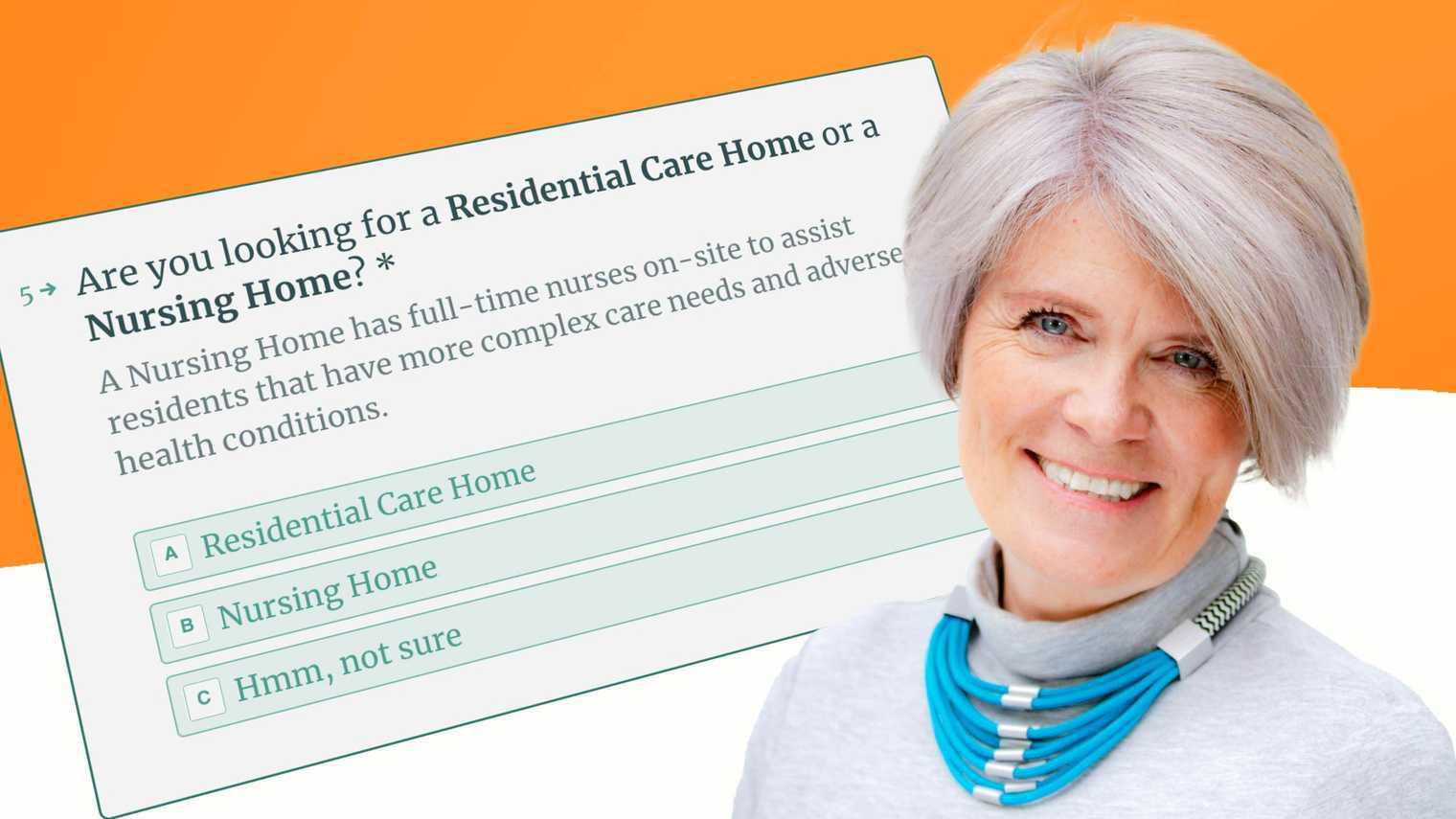

Whilst the idea of finding a care home may seem daunting, it's like anything else - much easier when you have a plan. Whatever your situation, if you are looking for later life care, our detailed guide will set you on the right path.
If you are funding your own later life care then you have lots of options when it comes to choosing the best care home.
Before you start to identify potential care homes, you need to know how to start narrowing the field. There are over 17,000 care homes in the UK - including homes for Adults with Learning Difficulties (ALD) - so it's a good idea to be clear on the 'must haves' before you start a detailed search for a care home or you could waste time, and risk becoming despondent.
The Autumna website does not include ALD listings but concentrates solely on later life care in all its forms - not just care homes, but home care and live-in care services and also retirement housing and assisted living.
A lot of people use our short form to narrow their search for later life care. It only takes a minute to complete, after which the Autumna team can send you a filtered shortlist of providers in your area, offering the care you need at a price that fits your budget.
Read on for our step-by-step guide and useful information on planning for you future.

As is often the case, thorough preparation gives the best results when you need to find the best care home for your needs.
If you do not have a Lasting Power of Attorney (LPA) in place then it should be considered. An LPA allows nominated family members to act on your behalf should you become incapacitated in any way.
You’ll need to talk to a solicitor specialising in family law as a Lasting Power of Attorney is a legal document.
Your family will need to know about any existing medical condition/s and the long-term prognosis so that you can all plan your on-going care needs effectively. That may mean a joint consultation with your GP so that you are all clear on the current situation and the future prognosis – and so that the GP has a record of who to speak to at any point.
You will swiftly discover that there are many different categories of care home provision - it is therefore important to look at those that can cater for your likely long-term needs and not just for now. If you have a degenerative condition, your needs will change.
Residential care homes come in all shapes and forms but the two main categories are those that provide just residential care and those that provide nursing care.
Some residential care homes will also provide dementia care and some nursing homes will also provide dementia care. Most homes will also provide respite care - a short stay of around two to four weeks - which is a great way for prospective residents to 'try before they buy.'
In England, anyone with assets in excess of £23,250, including their home as long as their spouse is no longer resident, will have to fund their own care.
Residential care for self-funders typically costs from £750 - £1200 per week – but can be more for homes that are more like 5* hotels – or where 24-hour one-on-one nursing support is required.
Knowing how much money will be available, how to release funds, and how long it will last, is vital before you start the search for a care home.
It may at first look as though the sums won’t add up, but rest assured, there are various financial management schemes available geared specifically to the ongoing release of funds to cover long-term care needs.
We advise that you contact a registered Independent Financial Adviser (IFA), someone who has the SOLLA (Society of Later Life Advisers) accreditation. They will be able to provide initial guidance and tailored advice should you need it.
You can find more useful information in the section headed Paying for Care on this site, or get in touch with our trusted partner, Schroders Personal Wealth who will be able to advise you.
If you and your family have never discussed the possibility that you may one day live in a care home, there may be a lot of ground to cover quite quickly. It’s not unusual to be opposed to the idea initially, and to want to stay in your own home.
It’s important to be realistic about location and environment. Someone who has enjoyed the silence of the countryside may not want to move to the centre of a busy town, however, perhaps most importantly, the chosen care home should be near enough for family and friends to visit.
Once you have identified where the care home needs to be (+/- 5 miles), the maximum amount it can cost and any medical conditions that you need to bear in mind, try and identify what else will help you to refine your search quickly. The following list should cover most things you need to be thinking about:
Once you start to using the Autumna later life care directory you'll soon find it's easy to compare and contrast homes because each one is formatted in the same way with 'tabs' that guides you through the questions you should be asking.

Of course, you could also get an expertly compiled shortlist sent to you from the Autumna advice line team, simply by filling in this quick and easy form.
From the information you give, Autumna will find an initial ‘long’ shortlist of potential care homes for you to look at. You’ll be able to review detailed information on each, comparing one with the other from the comfort of your own home, and then make direct contact with any that look promising.
Alternatively, if you have a more complex situation and needs, or you are feeling a little confused - perhaps overwhelmed - for a small fee, Autumna's team of care home experts can conduct the research on your behalf. They will make contact with all the homes that may be able to help you, and come back to your best options presented in a bespoke Care Home Report.
If this more personalised care home research service appeals to you, please get in touch on info@autumna.co.uk or by calling our team on: 01892 33 53 30.
You should be able to eliminate some of your early options from the long list fairly quickly by doing a like-for-like comparison of each whilst also checking on a map to see precisely where they are located.
Once you have done this, it’s a good idea to call those care homes that you are left with – it’s all part of the securing a vital ‘First Impression’.
Some things to look out for from Autumna's years of experience in contacting care homes:
The only way to confirm or challenge the opinion you’ve formed after your online search and your phone call, is to pay a visit. A visit to the care home is the ideal opportunity to search for any missing pieces to the jigsaw and get answers to any specific questions you may have.
If you are planning to visit a care home with a view to moving in, it’s important that someone goes with you – ideally a close friend or relative who knows you well. Not only are two sets of eyes better than one, but you'll be able to discuss the pros and cons of the home with them afterwards.
Ask if you can take photographs - it should be fine if you don’t include residents in the pictures.
Over and above anything else, you need to be able to identify with ‘how it feels here’.
Since the pandemic most care homes will have restricted - by appointment only - visiting. Whereas we used to advise that any prospective resident should arrive unannounced, that is no longer the case and, unless you have pre-booked your visit, you are unlikely to get a 'show round'.
Bear in mind that Monday – Friday runs like a working week; weekends are slightly more relaxed and the care home manager may not be there. However, you will probably have the opportunity to meet more visitors which can be very useful.
4. On the tour, what do you notice?
Much of this information can be obtained from the online profile of the care home on Autumna, however whilst you are there, it's always useful to seek confirmation.
A. Staff
B. Residents’ Rooms
C. Communal Areas
D. Food and mealtimes in the care home
Autumna has recently introduced CHOICE Dining which is the first ever food accreditation in care homes across the UK. Look for the CHOICE Dining badge on any care home profile on Autumna to find out exactly what standard of food is on offer.
E. Organised activities at the care home
F. Outdoor Space
G. Medical and Wellbeing Services
H. Safe Mobility
I. Security
J. Language, Religion, Culture
K. Guests
L. Fees
M. Availability
N. Legalities
The care home is obliged to provide a brochure which should clearly set out the following:
If you let your heart rule your head from the very beginning then you may be prepared to overlook things that are very important to you. However, once you are confident that the care home has everything you need, ask yourself: '... can I imagine myself living there?'

Once you have ticked off everything on your check list, reflect, and ask yourself:
Make sure you satisfy yourself that the reality matches the marketing message.
And before you sign any agreement:
"This may seem an immense amount to think about – but the decision you will be making, whether for yourself or a loved one, is one of the most important you will ever make. It's about ensuring that life can be lived and enjoyed, in the best possible environment – and surely everyone should be able to do that?"
10,413
Care Homes
12,403
Home Care Services
1,671
Live-in Care Services
1,826
Retirement Living Developments
Autumna is the UK's largest and most comprehensive later-life living & elderly care directory. Our detailed search facility and team of expert advisors can help you find the best care homes, nursing homes, retirement homes, retirement villages, home care, and live-in care services for you or your loved one's needs. Our website is free to use, we are proudly independent, and we never take referral fees.